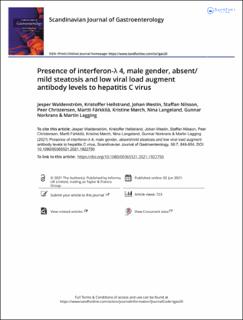Presence of interferon-λ 4, male gender, absent/mild steatosis and low viral load augment antibody levels to hepatitis C virus
Waldenström, Jesper; Hellstrand, Kristoffer; Westin, Johan; Nilsson, Staffan; Christensen, Peer; Färkkilä, Martti; Mørch, Kristine; Langeland, Nina; Norkrans, Gunnar; Lagging, Martin
Journal article, Peer reviewed
Published version

Åpne
Permanent lenke
https://hdl.handle.net/11250/2992668Utgivelsesdato
2021Metadata
Vis full innførselSamlinger
- Department of Clinical Science [2318]
- Registrations from Cristin [9791]
Originalversjon
Scandinavian Journal of Gastroenterology. 2021, 56 (7), 849-854. 10.1080/00365521.2021.1922750Sammendrag
Objectives
Despite recombinant interferon-λ 4 (IFN-λ4) demonstrating anti-viral activity in vitro and the ancestral functional gene (IFNL4) being conserved in all other primates, there has been speculation that IFN-λ4 may be detrimental in humans. In light of recent rekindled interest in humoral immunity, this study aimed at evaluating the impact of baseline characteristics, including IFNL4, on antibody levels to hepatitis C virus (HCV).
Materials and methods
Pretreatment sera from 279 well-characterized North European Caucasians with chronic HCV genotype 2 or 3 infection having undergone liver biopsy were analyzed regarding IFNL4 (rs12979860) and anti-HCV antibody levels using a commercially available assay.
Results
Patients producing IFN-λ4 had higher signal to cut-off (S/CO) anti-HCV antibody ratios as compared with those lacking IFN-λ4 (IFNL4rs12979860 CT/TT versus CC, p<.0001, Mann–Whitney U-test). Additionally, in univariate analyses S/CO was significantly higher in men than women (p<.001), as well as in patients with absent/mild interface hepatitis (Ishak grade 0–2 versus 3–4, p = .009), and absent/mild steatosis (grade 0–1 versus 2–3, p = .0005). Also, an inverse correlation with HCV RNA level (rs= −0.14, p = .02) was noted. In multivariate analysis IFN-λ4, gender, steatosis and viral load remained independently associated.
Conclusions
To our knowledge, this is the first report that demonstrates that the ability to produce IFN-λ4, in addition to male gender, absent/mild steatosis, and lower viral load, augments antibody levels against HCV. This indicates that IFN-λ4 may be associated with T helper cell 2 (Th2) immune skewing, which might have clinical implications beyond HCV infection. ClinicalTrials.gov Identifier: NCT00143000
